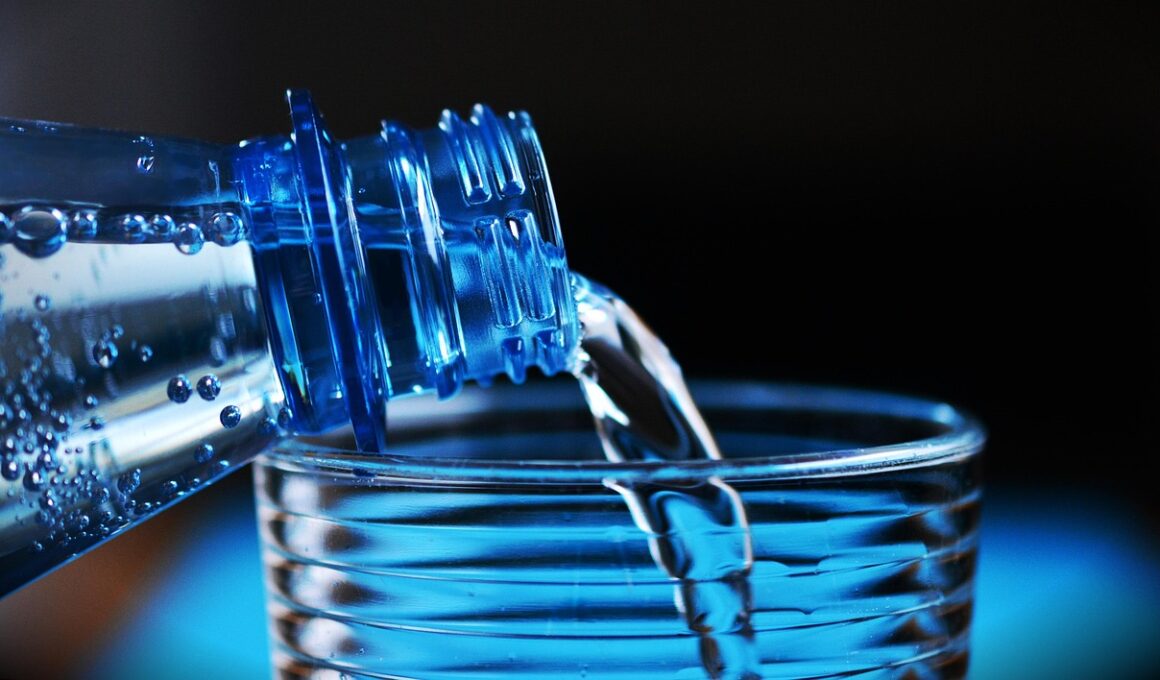Hydration Strategies for Those New to Intermittent Fasting
Proper hydration is essential for those starting intermittent fasting. When you fast, your body goes through significant changes, and hydration is one of the most critical factors in ensuring that these changes are manageable and healthy. Staying well-hydrated helps to support metabolic functions, energy levels, and overall wellness. Water should always be your primary focus, but during fasting initially, some may experience hunger or discomfort. Supplemental electrolytes, particularly sodium, potassium, and magnesium, may help to ease these sensations. It is crucial to monitor your body’s signals and adjust your water intake accordingly. Keeping a water bottle nearby can serve as a reminder, encouraging you to drink regularly throughout the day. Aim for at least 8 cups of water each day, but listen to your body and increase if necessary. Herbal teas and black coffee can also count towards your fluid intake. These beverages are calorie-free, making them excellent choices during fasting periods. Remember that your hydration needs may vary based on activity level, climate, and individual health conditions, so be sure to adapt your strategy as needed.
During your intermittent fasting journey, understanding your body’s hydration signals is vital. It can be easy to overlook hydration when adjusting to a new eating schedule. One effective way to monitor your hydration status is by observing your thirst levels and urine color. Light yellow urine typically indicates proper hydration, while darker urine may be a sign that you need more fluids. It’s essential to differentiate between thirst and hunger as well. Many times, people confuse feelings of thirst with hunger, leading to unnecessary snacking. Challenge yourself to drink a glass of water before reaching for food; you may discover that your cravings subside. If your goal is to maintain or lose weight, managing hydration can play a pivotal role. In addition to plain water, consider infusing it with fruits or herbs for added flavor without added calories. This can make sipping water more enjoyable, particularly during fasting. Additionally, be mindful of diuretic beverages like caffeinated drinks and alcohol, which can lead to increased fluid loss, thus requiring more water intake.
Optimal Beverage Choices
When practicing intermittent fasting, selecting the right beverages can supplement your hydration efforts significantly. Flavorful options can enhance the fasting experience, making it easier to stick to your routine. Herbal teas, such as chamomile, peppermint, or ginger, are excellent options as they are caffeine-free and provide hydration without breaking your fast. Another alternative is drinking flavored electrolyte drinks. Look for those low in sugar. Electrolytes can help to replenish lost minerals, especially during prolonged fasting. Bone broth is another nourishing option packed with nutrients and hydration, making it a warm and comforting choice. Remember, though, to steer clear of sugary drinks, smoothies, or fruit juices during fasting periods, as these can spike your insulin levels and interfere with fat-burning. Keeping your beverages strictly low-calorie maximizes the benefits of intermittent fasting. Sparkling water is another trendy choice. With its effervescence, it can satisfy cravings while providing hydration as well. You can also enjoy a splash of lemon in your water for a zesty twist while still adhering to your fasting protocol.
Hydration also plays a crucial role in the detoxification process during intermittent fasting. As you fast, your body goes through various stages of cellular repair and cleansing. Drinking adequate amounts of water supports these processes and helps flush out toxins while enhancing liver function. Additionally, during fasting, it’s not uncommon to experience headaches or fatigue, particularly in the beginning. Oftentimes, these symptoms can be alleviated by increasing water intake. Ensuring your body has enough fluids can combat these feelings. Ensure that you gradually increase your water intake in the days leading up to your fasting start. This adjustment can help your body better adapt to the changes ahead. Concentrate on drinking a sufficient amount of water throughout your eating windows. Consider setting goals or challenges, such as a daily water intake tracker. This can help you stay accountable to your hydration goals. For added variety, consider herbal teas or homemade electrolyte drinks to spice up your hydration routine. Always remember that hydration can impact your overall fasting experience immensely and should be prioritized daily.
Planning for Hydration
As you embark on your intermittent fasting journey, planning how to hydrate properly is essential. Pre-planning your fluid intake can help you meet your hydration goals more effectively and can easily fit into your daily routine. Consider setting specific water consumption goals, such as drinking a certain amount by specific times of the day. Utilizing water-tracking apps or marking your water bottle can provide helpful reminders throughout the day. This approach can enhance your awareness and encourage consistency in hydration habits. Taking care of your body goes beyond what you eat; hydration is a vital aspect that should not be neglected. If you know you have a busy day ahead, prepare by filling your water bottle before leaving home. Additionally, generally, having water accessible at work or during activities is crucial to ensuring you stay refreshed. Remember that excessive water consumption can also lead to significant health issues, so follow your thirst signals and listen to your body. Your hydration needs may vary throughout the day; adapting accordingly is key to achieving a successful fasting routine that leaves you feeling energized.
Listening to your body is crucial, and maintaining proper hydration is an integral part of the intermittent fasting process. Creating a fluid schedule can also assist you in remembering to drink water regularly during fasting periods. For example, you might choose to drink a glass of water after waking up, during each meal, and another before bed. Establishing this rhythm helps maintain consistent hydration without overwhelming yourself. The anticipation of eating also provides opportunities for hydration. For instance, you can squeeze fresh lemon or lime juice into your water as a vibrant and hydrating alternative. This layer of flavor not only encourages you to drink more but brings added benefits too, such as vitamin C boosts. Be aware as your body adjusts to the fasting cycle; it may initially require extra care in hydration. As your body learns to adapt, it’ll eventually communicate more effectively through thirst signals. Stepping into intermittent fasting for beginners can be made easier by establishing hydration strategies early on, which can lead to increased success in meeting your health and wellness goals.
Conclusion: Emphasizing Hydration
As you transition into intermittent fasting, prioritize hydration as a key component of your routine. Proper hydration can significantly enhance your fasting experience, providing comfort and support during the process. Not only does water help to alleviate potential cravings and feelings of fatigue, but it also aids in detoxification and overall cellular function. By employing various strategies, such as infusing your water with fruits, setting daily water goals, and actively tracking your intake, you will be more inclined to reach your hydration targets. Keeping your fluids varied and enjoying herbal teas or light broths can keep you engaged and motivated. Ultimately, hydration allows you to embrace the benefits of fasting fully. Pay attention to your body’s signals, as they can guide you in balancing your intake effectively. Every person’s journey is unique, and understanding your hydration needs is crucial to fostering a healthier lifestyle. As you embark on this path, remember that achieving success in intermittent fasting can be influenced heavily by how well you hydrate. Celebrate your progress and enjoy the journey ahead!
This is another paragraph with exactly 190 words…





